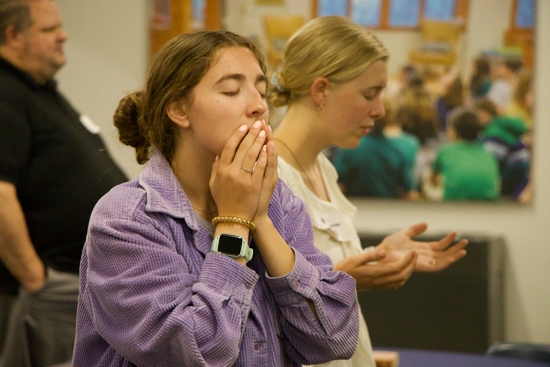
Luke Klavins, 25, from Holy Name of Jesus in Medina, was one of many youth ministers and faith formators in St. Joseph Hall at the Archdiocesan Catholic Center (ACC) in St. Paul Aug. 18-19 for Youth Discipleship and Faith Formation (YDFF) training. In the social hour that followed an all-day training on the second day, Klavins enjoyed a beverage and his community of ministers, formators and friends.
It was here that he shared something personal. Klavins knows the pain of having an absentee father. For years, he was crushed by this. By the end of his first year in ministry, he said he felt like a mess. He realized he wasn’t fully healed from his family wounds, and when reflecting on what God had done that year in his ministry, he realized that God let him carry wounds so that he could meet others where they are.
“I did middle school OCIA (Order of Christian Initiation of Adults) this year, so I had four kids coming into the Church. All four of them were young boys. All four of them had absent fathers,” Klavins said. “I myself grew up with an absent father. As I’ve grown older and began integrating myself as an adult male, I found this emptiness and a lot of woundedness. That father wound is so there. But because I (bore) that this last year, and I still believe Christ was good, I was able to tell these kids that didn’t have fathers that I bear the same wound … and I think Christ is so good, and that was a beautiful witness.”
Klavins said he carries his suffering and sorrow for God’s glory, and now he’s in a place where he feels honored to do that.
Faith formation and young adult ministry are difficult jobs, as most people at the orientation recognized. The two days themselves were meant to give new ministers and formators — people who have been doing this for three years or less — a moment of rest and community, to be filled with prayer and relationships before going back into the field to evangelize.
“It’s a high turnover rate,” said Naomi Hasegawa, Latino youth discipleship coordinator for the Archdiocese of St. Paul and Minneapolis. “The average time that a youth minister stays (as) a youth minister is pretty low because it’s a grind. There (are) many things you need to balance, like your personal life and your work life, but then it’s also ministry. So, you’re emotionally and spiritually involved with your youth and with the parents. It could take a toll on you personally, too.”
Mental health became a focal point for this year’s orientation. Pat Millea, a speaker and former youth minister at Our Lady of Grace in Edina, St. Michael in Prior Lake and St. Joseph in West St. Paul, gave a presentation on mental health and how to address it on Aug. 19. He and his wife, Kenna, co-founded the Martin Center for Integration, an organization that provides counseling and training presentations on mental health and spiritual needs.
Pat Millea said everything the Martin Center does — clinical practice, consulting, podcasts — is directed toward helping people be fully alive.
However, Millea warned against the “messiah complex,” in which someone may desire to be a savior to others. To counter this, Millea told youth formators and ministers to be the ones who lower people through the roof of the house rather than trying to be the one who heals. It’s important, Millea said, to have humility when working with someone with a mental health issue.
The training and future summits, Hasegawa said, allow ministers and formators to reconnect with people who understand them. Throughout the orientation, presentations and knowledge were given by veteran ministers and formators. During training on Aug. 19, a panel of eight ministers and formators answered questions, including Joe Schiltz, youth minister at St. Therese in Deephaven. “Hopefully I can give some insights or some ideas that’ll help other people,” Schiltz said after the panel discussion. “I myself just benefit from being surrounded by colleagues, by knowing I’m not alone, by hearing other ideas or hearing that other people are also struggling. The community aspect is so important to keeping youth ministers strong and not burned out. If my presence here can add a little drop in that bucket, then I’m happy to do it.”
To Hasegawa and others, youth ministry and faith formation is more than a job. It’s a calling, and it has to be, Hasegawa said.
“It’s like when you have a conversion and you want to do something about it. A lot of people go on mission trips, and there are a lot of people who feed the homeless, and I think there (are) some people that are called to youth ministry,” Hasegawa said. “You see these youth having conversions and meeting the Lord and growing in their relationship with the Lord, and that’s really fruitful and beautiful, too,” she said. “It’s the perfect balance of cross and resurrection. You have hardships, but then you also have the glories.”
During Mass in the ACC chapel, Bishop Michael Izen commissioned the formators and ministers to go out into the local Church and continue to evangelize.
“Today, we ask God to bless our brothers and sisters who have declared their willingness to serve the Church,” Bishop Izen said. “Lord God, in your loving kindness, you sent your son to be our shepherd and guide. Continue to send workers into your vineyard to sustain and direct your people. Bless these chosen sons and daughters. Let your spirit uphold them always as they take up the responsibilities among the youth of their parish.”



